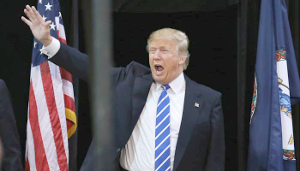The US military is attacking Syria tonight, after talking up the idea of unilateral military intervention throughout the day. Preliminary reports are that more than 60 Tomahawk missiles have been fired against various targets inside Syria.
 Russian deputy Ambassador Vladimir Safronkov warned earlier in the day of “negative consequences” if the US followed through on its threats to attack, and now that they have, the big issue is the potential fallout if any Russian military casualties are caused in the US strikes.
Russian deputy Ambassador Vladimir Safronkov warned earlier in the day of “negative consequences” if the US followed through on its threats to attack, and now that they have, the big issue is the potential fallout if any Russian military casualties are caused in the US strikes.
President Trump’s campaign stance, moving away from the US trying to impose regime change on Syria, appears to have been totally abandoned in recent days, and earlier today he informed some members of Congress that he was considering a military attack on Syria.
The shift in Trump Administration policy is publicly being justified by a bombing attack in northwest Syria Tuesday, allegedly a chemical weapons attack. President Trump insists Syria has “crossed many lines,” and is insisting that his position on Syria has changed, adding that “I now have responsibility when it comes to Syria.”
US, British, and French diplomats were pushing for UN action against Syria now, though a Russian veto at the Security Council is assured, with Russian officials saying the resolution is based on “fake information.”
US Ambassador to the UN Nikki Haley insisted the UN has “consistently” failed to act against Syria, and warned that states would as a result be compelled to act unilaterally without UN authorization. Haley added that Syria’s “illegitimate government” was committing “untold atrocities.”
All of this sounds remarkably familiar to the statements by US officials when the Obama Administration was planning to attack Syria, and while it’s not clear President Trump is willing to risk war with Russia by launching such an operation, Secretary of State Rex Tillerson’s warning that Russia needs to reconsider its continued support for Syria, suggesting that at the very least the administration is fine with continuing to raise tensions with Russia over the matter.
The gas attack incident, however, still has a lot of questions, with the Organization for the Prohibition of Chemical Weapons still just starting to probe the incident, and is well short of assigning responsibility. US officials, along with British and French officials, immediately had a complete narrative fitting with their interest in moving against Syria, and are refusing to consider any possibility that runs counter to that, including Russia’s suggestion that a conventional air strike had caused a leak in a rebel chemical cache.
The Pentagon claimed they’d detected the bombs on radar and confirmed they were from a Syrian warplane. Of course, because chemical and conventional bombs don’t show up differently on a radar, this still does not discredit Russia’s version of events.
The shift in US policy, however, really began before the alleged gas attack even took place, as in the days ahead of it, officials were again demanding Assad’s ouster, and rebel officials were reporting that the previously halted CIA arms shipments had been resumed recently. This is just serving as a justification for being more public with it, and hyping a war of regime change.
Obviously, all of the same problems with the US moving against Syria militarily, which Trump pointed out in presidential debates, are still problems, and that may ultimately deter an American attack. Either way, the Trump Administration is looking to rebrand their official stance as a hostile one, and one which is likely to please other NATO members, who see it as a chance to forestall any normalization of US-Russia ties.







